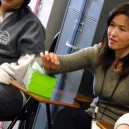CSWE Accredited MSW Degree
 For almost all aspiring social workers, earning a Master of Social Work (MSW) degree isn’t just important, it is essential. This is because every state in the country requires that its licensed social workers earn a MSW degree before they can even apply for the license. But just any old MSW degree won’t always satisfy the requirement. In fact, most states require that the MSW degree is earned at an “accredited institution”.
For almost all aspiring social workers, earning a Master of Social Work (MSW) degree isn’t just important, it is essential. This is because every state in the country requires that its licensed social workers earn a MSW degree before they can even apply for the license. But just any old MSW degree won’t always satisfy the requirement. In fact, most states require that the MSW degree is earned at an “accredited institution”.
This shouldn’t be problematic for most students because any degree program worth its salt has already received accreditation. But the state requirement does mean that students should really limit options to only those schools that are already accredited. The good news is that there is only one organization that handles accreditation of MSW programs -- the Council on Social Work Education (CSWE). The other good news is that the CSWE keeps a handy list of all of the accredited Bachelor of Social Work (BSW) and MSW degree programs in the country on its website.
Spotlight CSWE Accredited MSW Program
The bad news is that, according to the database, there are almost 250 total MSW degree programs offered around the country, which makes it very difficult for any student to even attempt to narrow down his/her search. This is especially true because although each MSW program has standardized curriculum required by the state and the CSWE, not all MSW programs are alike. In reality, many programs are different. Some offer dual-degree opportunities. Some are fully online degree programs. Some are online degree programs with campus requirements. And some offer concentration opportunities in subjects like Gerontology, Mental Health, Research and International Social Work. In the interest of simplifying the search process and highlighting some of the most important aspects of the process, we created this guide to help students find a way to narrow down the search process.
What Exactly Is CSWE Accreditation?
The goal of the accreditation process is to advance academic quality, demonstrate accountability, encourage self-scrutiny and demonstrate review of the practice. In laymen’s terms, the accreditation process is designed to ensure that the program applying for accreditation meets the minimum standards that will prepare students for a career as a social worker. Although it sounds like accreditation is a relatively simple process, it is actually a multi-layered process that involves multiple governing bodies and includes rigorous review procedures.
In the interest of clarity, it is important to note that the CSWE is the accrediting body for social workers, but it is the Commission on Accreditation within the CSWE that actually looks at each program individually. Furthermore, it is the Council for Higher Education Accreditation (CHEA) and its Committee on Recognition that initially determined the CSWE was a worth accrediting body. If a student is actually interested in learning how the CHEA determines whether an organization like the CSWE is fit for accrediting, they lay out the guidelines in this document. It isn’t important to remember the names or acronyms of any of these organizations. What is important is understanding the criteria that the CSWE looks at when it is accrediting a program. By its own admission, the CSWE uses “Educational Policy and Accreditation Standards (EPAS)” to accredit MSW programs. These EPAS are comprised of four categories of curriculum design: program mission and goals’ explicit curriculum; implicit curriculum; and assessment. A more specific description of what specific characteristics are a part of the EPAS can be found here.
The Accredited MSW Degree Program Landscape
In March of 2015, the CSWE released its annual census of the social work education called “The Annual Survey of Social Work Programs.” The data included in the report is from 2014, as the 2015 edition of the survey hasn’t been released, but there is a lot of interesting information for digestion. The most recent data shows that there was a total enrollment of 37,771 full-time and 18,623 part-time social work students as of 2014, which is a 21 percent increase from the enrollment in 2010. California and New York were responsible for more than 10,000 of those enrollments and after the two obvious states, Pennsylvania, Massachusetts and Michigan were the most popular states for enrollment in MSW degree programs. The demographics of these students show that an MSW degree program is still overwhelmingly (85%) female and that more than 70 percent of those students were under the age of 34.
The type of MSW degree programs being offered is interesting as well. For example, 15 years ago the only MSW degree options were of the full-time variety where students were expected to finish the program in two years. That is still the most traditional and popular route, but part-time offerings are now in place at more than 85 percent of MSW degree programs. This is important because part-time options allow students more scheduling flexibility so they can work at the same time they are getting the education. Also, social work has been one of the easiest degree subjects to transition into an online format and it is starting show. There were still just 11 schools surveyed that said the program was available entirely online. But more than 100 programs said that part of the program was online or hybrid and other 43 schools said that online or hybrid classes were being developed. All of this just shows that MSW degree programs are changing and that while they will always have the same core curricula, technological advancements and diversified student bodies make it so that the programs must adapt to stay ahead of the curve.
The best news of all is that the data shows that the MSW degree program does exactly what it is intended to do – prepare the students for the clinical examination and a career as a licensed social worker. According to the most recent data from the 71 programs that answered the question, roughly 78 percent of students passed the clinical examination for licensure.
Types of Accredited CWSE MSW Degree Programs
For the most part, MSW degree programs are very similar. This is primarily because the CHEA and thus the CSWE has very strict requirements on curriculum that must be included for a program to qualify for accreditation. An in-depth breakdown of what curriculum and standards have been required by the CSWE, they can be found here, in the organization’s most recent publication of its EPAS.
Read more about online MSW degrees, CSWE MSW online programs, and CSWE BSW online programs.
The most obvious difference in most MSW degree programs is that some offer online coursework or online degree options and others don’t. For more details on online MSW degree programs, visit our breakdown of all the accredited options available to you.
Aside from online options, there are three big characteristics that can set some MSW degree programs apart from others. Those four characteristics are: flexible scheduling; advanced standing availability; dual-degree opportunities; and concentrations/certificates.
Flexible Scheduling: Perhaps a simpler way of describing this is full-time vs. part-time. As was mentioned above, this is no longer as differentiating as it used to be because almost 90 percent of all universities offering MSW degree programs allow for a part-time option for students. The differences between a full-time and a part-time MSW degree program are pretty simple and self-explanatory. The part-time program is still very structured, it just allows students who don’t have the availability to enroll in a part-time program to extend the schedule to fit their options. Full-time degree programs typically take two years for students to complete while part-time programs can take anywhere from 2-3 years can complete. The usual part-time schedule is simply one with less classes per semester. Students would be wise to consider part-time programs if they are gainfully employed or otherwise busy during the week. This flexibility cannot be understated when it comes to pursuing a graduate degree.
Advanced Standing Availability: Advanced Standing is essentially an accelerated MSW degree program almost exclusively open to students who have already received a BSW degree. The reasoning is that many of the core MSW classes are also core BSW classes, so students who already have the BSW shouldn’t have to repeat courses they have already passed. Typically, advanced standing students are able to skip core requirements and get straight into subject-specific material. Incredibly, although advanced standing options are now prevalent and continue to grow in popularity, they are still not offered by all or even most degree programs. So if you are a student who already earned a BSW, it would be in your best interest to look for an advanced standing program.
Dual-Degree Opportunities: One of the coolest part about pursuing an MSW degree is that it doesn’t always preclude interested students from pursuing degrees in other subjects as well. According to the survey from the CSWE, more than 200 MSW degree programs in the country reported offering at least one joint degree opportunity, which is great news for students looking for a diverse education. Some schools will differentiate between joint degrees (where credit from a course counts toward both degrees and the degrees will be conferred simultaneously) and dual degrees (where credit only applies to one degree program). According to the CSWE survey, law (22.9%), public health (18.9%), public policy (12.6%) and theology (11.1%) were the most popular and frequently reported joint degrees. Other options include criminal justice, gerontology and women’s studies.
Concentrations/Certificates: On their own, concentrations and/or certificates are offered by nearly every MSW degree program worth its salt. They are not, however, the same thing. A certificate usually comes from a standalone program on the subject. The program is designed to be shorter and more focused than a degree program and it usually is used by students looking to expand their skills base, qualify for a particular job, or make themselves more appealing to potential employers. Concentrations are essentially majors or minors within the MSW degree program. More than 200 programs surveyed reported offering at least one formal certificate, the most popular of which were gerontology (25.0%), school social work (20.1%) and substance abuse (11.6%). According to the survey, 192 MSW programs reported almost 40,000 students enrolled in concentrations or specializations, the most popular of which were clinical (31.8%), advanced generalist (26.0%), mental health (18.2%) and families (13.0%).
CSWE Accredited Schools
Explore CSWE accredited programs and request information from our full list of schools.
| Schools | |
|---|---|
Bethany College
31 S Loop Campus Dr, Bethany, WV 26032
Phone: (304) 829-7150 | |
Family Studies and Social Work" |
























